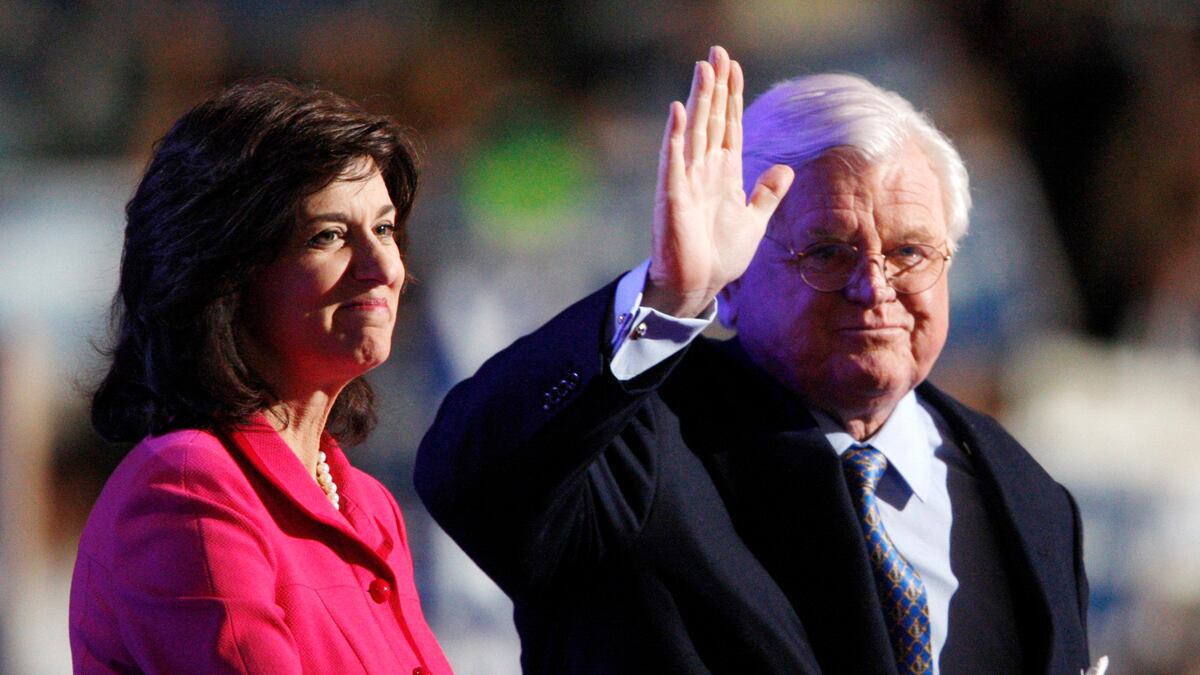Talk a little bit about how you see the senator’s legacy.
I think his legacy is the passion that he brought to public service, fighting for what he believed in, reaching out across the aisle to get things done but never losing—never forgetting his true compass.
In 20 years, what are the history books going to say?
I’m very biased. I think he’s going to be one of the greatest senators ever to be in the history of the country. Others have said that and others have written that, and I think objectively historians will find that—because of the legislation that he passed, the difference he made in people’s lives, his effectiveness as a senator.
People may not realize the impact he has had on everyday lives—whether it’s airline deregulation, or health, education, or labor issues. Certainly longevity had something to do with it, but there are other senators who were in for a long time who don’t have that same depth and breadth of legislation that they sponsored or cosponsored.
Tell me what responsibility you feel toward maintaining the legacy.
Oh, I feel an enormous responsibility.
Talk a little bit about that.
“Responsibility” might not be the right word. It’s a passion within me because I knew him so well and I want people to know him. I want to keep that legacy alive, not just for him but for our country, because I believed in what he believed in. I believed in what he fought for. I believed in the way he fought for it. And I think we have a lot to learn, and I hear so often from both Republicans and Democrats that we miss that, and I think we can find it again.
Teddy was a fierce and fun-loving partisan. He loved the Democratic Party. He loved being a Democrat. And he would get, as I used to tease him, red-faced and full-throated on the floor of the Senate. But he also reached across the aisle and understood how to get things done. It’s one thing to advocate for your principles, but you need to govern. He always sought common ground, but he wasn’t a person who saw ill in people.
He looked for good and he thought that everyone wanted the same things for our country, but we just had different ways of getting there. And I think starting from that place allowed him to collaborate. He knew what he believed. He knew how far he could compromise. He didn’t compromise for compromise’s sake.

He knew where the line was.
He knew what he was trying to accomplish. He would vote for things that he wished he didn’t have to vote for if that’s what he needed to do to get things done—to get something else, if that was the agreement, to get the overall bill passed because he knew how far he could go.
Looking at the gridlock in Congress right now, what would he think?
Well, you know, the one thing I don’t do is say what he would do.
But what I can say is … he understood what a political season was. And we’re in the middle of a political season.
But don’t you think this has been going on a little bit longer than the political season?
It’s been going on a long time. I personally think we’re in a difficult time, and I hope we get beyond it.
As someone who knew him, though, how do you think he would have tried to get out of this?
Well, if I can launch into the Edward M. Kennedy Institute for the United States Senate. What we’re doing there is going to have a positive impact on discourse in the country.
We’re going to be able to give a really dynamic, historic perspective of the United States Senate. And we’re going to be able to show how goodwill in both parties came together and addressed the most challenging issues facing our nation.
This is something that Teddy started thinking about back in 2002. The original vision came from him back in 2002–03. He and I started talking about, you know, what did he want his legacy to be.
He wanted it to be having other people engaged in our democracy. He felt that people understood the presidency through presidential libraries, but that there was a lack of understanding about the Senate, and he knew without the Senate, constitutionally, things couldn’t happen.
He felt that the Senate changed a person, that once you got in the Senate, something happened to you. He found it to be, as he said, a “chemical” place.
He meant that the chemistry of people working together, that you felt that there was something bigger than yourself, bigger than your parochial interests, which is really how the Founding Fathers conceived the Senate.
That’s what’s missing today.
That’s what he wanted people to understand about the history of the Senate and how the Senate had risen to the occasion throughout history.
The core of our building is a representation of the Senate chamber, which was key for him. Instead of somebody’s initials carved on them, the desks are going to have iPads, where a visitor can look up everything about the senators who sat there.
We’re working with game experts to be able to create simulated Senate experiences. So let’s say the Civil Rights Act of 1964—which I am particularly passionate about because I think it’s such a perfect thing to study—it was the first civil-rights filibuster in the history of our country to be broken.
And it required Republicans and Democrats to come together and compromise to be able to break that filibuster and to pass the bill. And it’s such a perfect thing to study, because if that filibuster hadn’t broken, if that civil-rights bill hadn’t passed, what would happen in this country?
Give them an opportunity to become senators, see if they can break the filibuster, and find out what happens if you can’t.
I’ve never been prouder of anything I’ve ever worked on in my life. And in terms of Teddy’'s legacy, this is what he wanted. And for me, it is this huge passion of being able to have what he did live on because we’re showing throughout history.
This has been a great vehicle for you to channel your energy and grief, hasn’t it?
It has, enormously, because it’s been a positive way to get involved and this is huge.
You’re so passionate about the Senate. Did you ever seriously consider running for Teddy’s seat? You were under a lot of pressure.
There was a lot of pressure.
Let me just back up. Did your husband raise it with you?
He raised it with me a few times. But I would never discuss it. I always felt that he was the senator and I just thought, I said, “You’re the senator,” and I just would, I would shut it down. And he raised it with me before he got sick. He raised it with me after he got sick.
So he clearly liked the idea.
Must have because he raised it. But I always felt that he was the senator.
You know, there was that push. I was getting a lot of urging and pushing, but it just didn’t feel right to me.
Why is that? Because a lot of wives have done that—perhaps because it’s a way to hold on to the memory.
Not having Teddy. Honestly. I felt that I didn’t want his job. That was Teddy’s job.
I want to do his work, which I can do in the institute. I wanted to focus on the institute, which was something that he cared deeply about, and I thought I could really make a difference at the institute. I didn’t want his job.
Let’s talk about health-care reform a little bit—the senator’s passion. Why do you think it’s so unpopular?
I actually don’t think it’s that unpopular. When people know what’s in it, it’s very popular. The notion of something as it’s described is unpopular.
Did the White House not do a very good job selling it?
Well, I think it’s fair to say that something got missed. And once the conversation moved on, it somehow never got back.
Do you worry about the Republicans trying to repeal it?
I don’t think that there’s a chance that this is going to be repealed. The American people will not let it be repealed. I think it’s too big of a benefit and a plus for American people. We’re Americans. We move forward. We don’t move backwards.
Look at the difference it makes in terms of women’s health. Basically being a woman is no longer a preexisting condition. Women get treated equally. You don’t have a higher premium because you’re a woman. Preventive care for everybody is covered. You don’t have an annual max. If you get cancer, you don’t have to worry that you’re not going to be covered. I really don’t think they’re going to say, “Oh, please let me pay more.”




